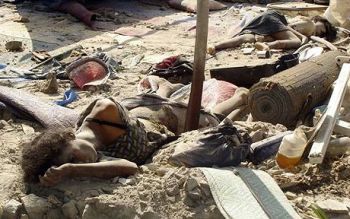
Publisher:
Bonnie King
CONTACT:
Newsroom@Salem-news.com
Advertising:
Adsales@Salem-news.com

~Truth~
~Justice~
~Peace~
TJP
Dec-11-2013 23:33

 TweetFollow @OregonNews
TweetFollow @OregonNews
SRI LANKA: Avoiding The UNSC For An International Investigation
Parasaran Rangarajan for Salem-News.comThere are several ways of avoiding the UNSC for a trial to commence against accused war criminals.
 These images of war crimes committed at Mullivaikal in 2009 will forever be associated with the Majinda administration in Sri Lanka. Courtesy: Srilankaguardian.org |
(LONDON) - The International Criminal Court (ICC) remains relatively new, formed in 2002, to address allegations of war crimes, crimes against humanity, genocide, and serious violations of international law.
 |
The Rome Statute remains the founding legislation of the court which expressly states the conditions required for taking up a situation for both investigations and trial. There are several ways in which this may occur and begin with the provisions detailed in Article 12 of the Rome Statute, all which require the concerned party to be a member of the court in some way.
Another way that the international court may consider a case is through referral from the U.N. Security Council (UNSC) when there is an “international investigation” into the last phases of the civil war in Sri Lanka conducted, either by the U.N. Human Rights Council (UNHRC) or through the powers exercised by the U.N. Secretary-General (UNSG) under Article 99 of the UN Charter. The UNSG fact finding missions are rarely rejected furthering the case for use of Article 99 of the UN Charter which the government of Sri Lanka was quick to criticize when the UN Office of Legal Affairs, the UNSG’s own legal team, advised him to exercise this instrument at the time of the genocide. Regardless, in both scenarios, the UNHRC and UNSG are required present their findings to the UNSC for referral to the ICC for further action.
 SL Pres. Majinda Rajapaksa |
However, the UNSC has been at the center of controversy in recent times as it rejected a referral for the situation in Syria to the ICC after investigation by the UNHRC due to vetoes by Russia and China. In the case of Sri Lanka, an international investigation which must be presented to the UNSC, might be vetoed by China as it is a strong supporter of the Rajapaksa regime due to economic and strategic interests in the Indian Ocean. This fact cannot be overlooked as an international investigation into the genocide which occurred in Sri Lanka, a term for what happened which cannot be argued now as it has been used by the government of India recently as well as the UN, would be pointless in terms of bringing change on the island without a meaningful and legally binding trial of the accused.
There are several ways of avoiding the UNSC for a trial to commence against accused war criminals. One, which has been suggested in the case of Sri Lanka by well known legal scholar and Professor Dr. Francis Boyle of the University of Illinois is to use Article 22 of the UN Charter which allows for the UN to set up a “subsidiary organ” such as a tribunal to prosecute the war criminals upon 2/3 majority vote at the U.N. General Assembly (UNGA) and call upon all member states to support a tribunal in case of such a veto at the UNSC upon the presentation of the findings of an international investigation.
Another viable option which has not been discussed in the case of Sri Lanka is for a State member of the ICC to invoke Article 14 of the Rome Statute which allows the State to refer a situation which falls under jurisdiction of the court for investigation. Article 15 of the Rome Statute allowing for the ICC Prosecutor to commence a “proprio motu” investigation is also possible but once again requires all the conditions of jurisdiction to be fulfilled or requires referral from the UNSC. This is certainly possible although the pre-conditions to the exercise of jurisdiction of the ICC as specified under Article 12 are quite restricted.
It is important to note that the island nation of Comoros referred Israel, also non-signatory to the Rome Statute, to the ICC invoking Article 14 of the Rome Statute for the first time in history earlier this year using a similar method for the incident involving Israeli forces raiding the flotillas to Gaza sent from Turkey as the vessels were registered in Comoros, giving the ICC means for jurisdiction under Article 12 (2) (a) of the Rome Statute.
To properly utilize this method in the case of Sri Lanka, we must first give recognition to the notions of criminal liability, responsibility, and complicity under customary law. We may refer to The International Criminal Tribunal for the Former Yugoslavia (ICTY) and its hearings for this matter. In Prosecutor v. Furundzija (Case No. IT-95-17/1), Prosecutor v. Vasiljevic (Case No. IT-98-32-T), and Prosecutor v. Blaskic (Case No. IT-95-14), it was found that “aiding” in international criminal law entails providing practical assistance that has a substantial effect on the commission of the crime. Furthermore, an “aider” must intentionally provide assistance to the perpetrator with knowledge of the perpetrator’s intent to commit a crime, but need not himself or herself support the aim of the perpetrator as stated in Blaskic and several instances in Furundzija. Another important fact to take note of is that the ICTY stated that a person may be liable as an accessory whether the assistance is provided before, during, or after the specific crime in question is committed in Vasiljevic and Blaskic.
Next, in the International Criminal Tribunal for Rwanada (ICTR), the supply of arms is directly linked with criminal liability for genocide. In Akayesu, the ICTR stated that:
“By procuring means, such as weapons, instruments or any other means, used to commit genocide, with the accomplice knowing that such means would be used for such a purpose.”
The ICC has expressly stated under Article 25 (3) (c) of the Rome Statute that a person shall be held liable for punishment for crimes within jurisdiction of the court such as war crimes or genocide if that person:
“For the purpose of facilitating the commission of such a crime, aids, abets or otherwise assists in its commission or its attempted commission, including providing the means for its commission.”
Realizing that a State signatory to the Rome Statue or a national of that State can be held criminally liable by the international justice system for supplying arms knowing that it will be used for war crimes, we turn back to the arms supplies to Sri Lanka in 2009 when the genocide was taking place. The U.S., India, and many other nations cut off arms supplies to Sri Lanka prior to 2009 when it was reported that there wide spread human rights abuses taking place on the island including war crimes as documented by government agencies and human rights organizations.
However, examining data from the Peace Research Institute Oslo (PRIO) and United Nations Commodity Trade Statistics Database (COMTRADE), we see that over $1.3M USD in ammunition were supplied in 2009 to the government of Sri Lanka from the Philippines, Brazil, Cyprus, Netherlands, and Switzerland. There is an interactive map created to highlight these authorized transactions and although there were no arms embargoes at the time, customary law in terms of knowledge of the usage of these weapons in light of reports of war crimes still apply: http://workshop.
In addition, the UAE supplied over 161 kilograms of bombs, grenades, ammunition, and mines to the government of Sri Lanka in 2009 according to the data provided by the UN organization COMTRADE. We may also look to arms suppliers party to the Rome Statute in late 2008 as well since they most certainly were aware of the situation on the ground at the time. Needless to say, the Sri Lankan Air Force bombed the “No Fire Zones” in 2009 making the mentioned nations or individuals who acted upon the authorizations accomplices to the genocide as much of the international community cut off their arms supplies to Sri Lanka in light of reports of allegations of war crimes being committed. Therefore, the notion these individuals or nations were not aware of the intent of the government of Sri Lanka will be difficult to prove although they might have supported it which is not required for the ICC to exercise jurisdiction. Any one of the mentioned nations or the individuals of that nation that are party to the Rome Statute may be referred to the ICC by another party of the Rome Statute under Article 14.
Most importantly, the government of Sri Lanka can be investigated by the ICC and the case may proceed to trial without UNSC referral and even though Sri Lanka is not party to the Rome Statute due to the observations of former ICC Prosecutor Moreno O’ Campo in his preliminary investigation in the allegations of war crimes in Iraq. Although that case did not proceed due to various reasons which do not apply to the case of Sri Lanka, his observation holds to be applicable, specifically he noted that:
“Some communications submitted legal arguments that nationals of States Parties may have been accessories to crimes committed by nationals of non-States Parties. The analysis of the Office applied the reasonable basis standard for any form of individual criminal responsibility under Article 25.”
Due to the fact that nations and nationals of States party to the Rome Statute such as the UAE supplied bombs to Sri Lanka with the knowledge that war crimes were taking place and the government of Sri Lanka did not have any intention of ending these offensives, the concerned individuals of the aiding State and the non-State Parties; the Rajapaksa regime may be investigated by the ICC for these war crimes using the reasonable standards for individual criminal responsibility under Article 25 of the Rome Statute provided there is enough evidence as noted by ICC Prosecutor O’ Campo. One might wonder, why Russia or China has not been taken to the ICC for supplying arms to Syria when it is noted there are war crimes occurring there but it is very simple, both are not signatories to the Rome Statute, there is no referral from the UNSC, and thus far no referral by a State party has been conducted where jurisdiction can be exercised.
Therefore, using these precedents, we may establish a link between a non-State Party and the nationals of State Parties to the genocide in Sri Lanka in 2009 requesting the ICC to commence an investigation without approval by the UNHRC, UNSG, UNSC or without Sri Lanka signing the Rome Statute by combining and citing customary law, requesting a State Party to the ICC to invoke Article 14 allowing for referral where jurisdiction requirements are met under Article 12 (2) (b) as a member state national is involved who aided the government of Sri Lanka in this genocide and individual criminal responsibilities in Article 25 of the Rome Statute are relevant.
Parasaran Rangarajan: Editor-in-chief for the International Law Journal of London and member of the legal department of the Prime Minister's Office of the TGTE.
 |
 |
 |
Articles for December 10, 2013 | Articles for December 11, 2013 | Articles for December 12, 2013

googlec507860f6901db00.html
Salem-News.com:



Terms of Service | Privacy Policy
All comments and messages are approved by people and self promotional links or unacceptable comments are denied.
Illangai December 12, 2013 12:57 pm (Pacific time)
Well written article.
[Return to Top]©2025 Salem-News.com. All opinions expressed in this article are those of the author and do not necessarily reflect those of Salem-News.com.